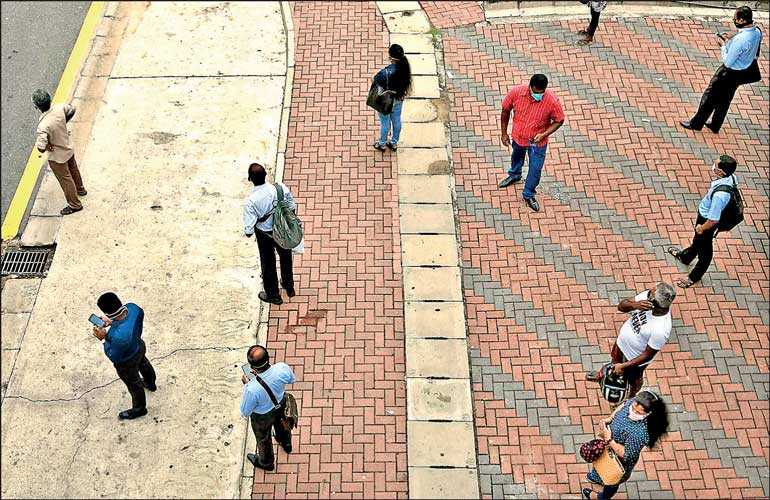Thursday Feb 19, 2026
Thursday Feb 19, 2026
Thursday, 30 July 2020 00:00 - - {{hitsCtrl.values.hits}}

Just as much as COVID has broken the system, it has created an opportunity to piece together a new one. Instead of myopically seeing this as a way to cut costs and stay afloat, can our brightest minds envision a new inclusive system that caters to real value creation in people’s lives and rejig our education system too to help generate real thinkers and leaders. If so, we may look back at 2020 as truly a revolutionary year that leads to significant evolutionary shifts in our perspectives and in our day to day lives – Pic by Shehan Gunasekara
There’s an old saying, “As your knowledge increases, your ignorance unravels”. In the last three months the challenges posed by COVID has really shone a spotlight on that ignorance. Our education systems have equipped us well – to navigate the streets of commercial tinsel town and to profit from it and gain fame power and wealth. To be a successful individual who knows how the system works. To manipulate or work it to your advantage so you are able to take care of the needs of your family. And are able to show consistent professional results for your employer. Even to take sessions on key topics in seminars and conferences on “what it takes to be a good manager”. This is what our education system trains us for.
We know how the machine works – there is a national GDP growth imperative, sectors that are likely to fuel that growth, the political system aligned to promoting their success in increasing or maintaining those growth numbers, there is a share market reflecting the sentiment of the investing public which looks at your profit numbers every quarter and determines your performance. And bets on your success if the indicators are consistently reflecting growth and profitability. 
It could be argued that more excel sheets with data and projections get manufactured in offices than do actual products. Infinite scenarios gets mulled, data crunched and projected to work the system’.
A kid really good in math will do well to learn how to temper his endemic childish curiosity as he grows up to just master the science of filling excel tabs and gain phenomenal commercial success. In fact there are some typically interesting successful management styles that have emerged as a result of our education and the corporate culture. And the leaders who don these styles spawn a generation of clone managers who ‘follow the leader’ for success.
The hard-nosed data cruncher – Excel lover, scenario builder, looking constantly for data to micro manage business. Fills his team’s time seeking multiple iterations with added and deleted columns of data and information. ‘Numbers are facts’ ‘Facts are everything’ ‘Plan every detail’ Execute plans daily – written KPIs are some of the hallmarks of this style of management. Takes pride in his view of life.
The negotiator – Constantly negotiating to cut costs. He is a terminator of the unnecessary cost. His forte is to ‘cut the supplier to the bone’. Very often these managers lighten up after a drink to reveal his ruthless negotiating skills which cut costs so ridiculously that he himself is surprised at his efficiency. A serial negotiator once revealed to me that he had learnt this skill from his father who negotiated a lower rate from a hospital while himself being wheeled into the ICU for a lifesaving operation.
The Boss Manager – He constantly second guesses what his boss is looking for – he can be hard-nosed data cruncher if needed or adapt into negotiator or become fierce and aggressive competitor (it’s up to his boss to determine his role). This guy knows how to say the right thing at the right time to the right people. He will generally talk about the way the system works and how he ‘managed’ a tricky market situation that earned big bucks for his organisation
The Salesman – He can sell you anything. Smooth with words and can sell an unsuspecting bovine some fresh milk. Seen as an asset who is needed for much needed market share. In the corporate system such a person is successful due to his personality and ability to impress one and all.
These are some of the archetypes based on my observation. There could be others. Common to all these successful role models are some fundamental core beliefs
It’s a zero sum game, unless we grab the market someone else will
It’s a war out there. Kill or be killed (metaphorically)
Negotiate everything lest you are paying anything extra unnecessarily.
Numbers show success. Strive coldly to better them every day.
It could be argued on the above basis that the system creates fear and generates a lot of negative stress to ‘achieve the unachievable’. This was the world as we knew it. And lived it. Till one day in 2020 when COVID hit the world. Everything from then has figuratively fallen apart.
The system has been really shaken. GDP projections globally have taken a hit. Consumption, sales and consumer behaviour have all undergone a giant possibly an irreparable change. A system created on fear and built on speculation, driven by adrenaline and testosterone has possibly collapsed. So how have the role model managers reacted.
As expected – with fear. The opportunistic archetype has come into play. The data cruncher, the negotiator, the salesman and the boss manager have all combined in the race to cut costs. And protect themselves. And their organisations. A multinational company finance head recently confided in me that he had a global dictate that profit margins must be maintained at ‘all cost’ even if COVID has resulted in reduced number in terms of sales. Which clearly means one thing –job cuts. COVID has been a value destroyer and fearful managers trained to generate profits are likely to destroy more value as a means of maintaining bottom lines.
But job cuts will mean even lesser purchasing power with the consumers and a spiral of value downwards that will be tough to arrest.
So what’s the opportunity that COVID provides – to genuinely change the way we work – I don’t mean work from home or work from office but to redefine the ‘system’ that’s on verge of collapse and rejig it to serve people, consumers and humanity at large.
Bhutan a beautiful Himalayan kingdom has for several years pioneered the concept of Gross National Happiness to replace Gross Domestic Product (GDP). This lays emphasis on the happiness of the people of the country as a measure of true progress. Is it time to dig deep into this concept and focus more on this qualitative measure of adding value to people’s lives as a way to create a more sensitive and sensible lifestyle for people around the world
Can we reward visionaries and value creators rather than value destroyers? Can we start following a more people based system? A profit based numerical system systemically prioritises bottom lines. It’s not a sustainable method as has become apparent during these trying times. Fearful managers, depressed employees, scared families uncertain humanity and widespread social unrest caused not only by COVID restrictions but by an economic system that has failed humanity.
Can our education system focus not on creating people ready for the job market but people who can think and adapt to change and actually create and envision more positive futures. And ones who inspire others to drive this positive change in society. People trained to think and adapt to change not ones trained merely to adapt to systems. Creators not merely followers.
Just as much as COVID has broken the system, it has created an opportunity to piece together a new one. Instead of myopically seeing this as a way to cut costs and stay afloat, can our brightest minds envision a new inclusive system that caters to real value creation in people’s lives and rejig our education system too to help generate real thinkers and leaders. If so, we may look back at 2020 as truly a revolutionary year that leads to significant evolutionary shifts in our perspectives and in our day to day lives.
A task like this is not only the responsibility of the managers but that of educators, business leaders, political leaders and civil society at large. All of who needs to come together to recognise the broken system, seize the opportunity and with consensus evolve a new one that’s truly sustainable and change friendly. Let’s not let a great opportunity to go waste. 2020 can yet be a year of not merely seismic quality in terms of destruction but the year which was the harbinger of true sustainable change.
(Santosh Menon is a marketing communications expert with 20 years of experience in multi-national locations. He can be reached at [email protected].)